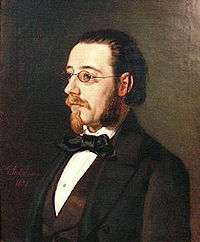Dalibor (opera)
| Dalibor | |
|---|---|
| Opera by Bedřich Smetana | |
 The composer in 1854, painting by Geskel Saloman | |
| Librettist | Josef Wenzig |
| Language | Czech |
| Premiere |
16 May 1868 Provisional Theatre, Prague |
Dalibor is a Czech opera in three acts by Bedřich Smetana. The libretto was written in German by Josef Wenzig, and translated into Czech by Ervin Špindler. It was first performed at the New Town Theatre in Prague on 16 May [1] 1868. The opera received criticism at the time for being overly influenced by German opera, including that of Richard Wagner.[2]
The subject of the opera is Dalibor of Kozojed (fl. c. 1490), a Czech knight who took part in an uprising in Ploskovice in support of the oppressed people and was sentenced to death in 1498, during the reign of Vladislas II. The plot bears a resemblance to that of Ludwig van Beethoven's opera Fidelio,[3] in that the central female characters in each opera disguise themselves in male clothing to try to save the hero.
Performance history
Smetana had great affection for the opera, but because of the lukewarm reception, died thinking that he had failed with this opera. The revival in 1886, however, two years after the composer's death, was a success.[2] In the 1890s, the opera received productions in Zagreb, Munich, and Hamburg.[4] Gustav Mahler conducted an 1892 production in Vienna.[2]
Synopsis
- Time: Fifteenth century
- Place: Prague
Act 1
Dalibor, a Czech Knight is on trial before the king for having murdered the burgrave of Ploskovice in revenge for execution of his friend Zdenek. At the trial, the king calls upon the burgrave’s sister, Milada, who demands his execution. As Dalibor is brought in, the crowd rises in support of him. When Dalibor tells of his friend’s capture and murder the court reduces his sentence from death to lifetime imprisonment. Milada painfully realized that she is falling in love with Dalibor, and in collusion with Jitka, an orphan befriended by the knight, she resolves to set him free.
Act 2
Milada enters the prison disguised as a boy and finds employment with Dalibor’s jailer, Benes. She charms Benes into allowing her into dungeon where Dalibor is being held. The knight greets her with jubilation and, in a passionate duet, they sing of their love for each other.
Act 3
They plot to bribe Benes, but the jailer informs the king of their attempted escape. Taking the advice of his council, the king orders Dalibor’s death. Milada, waiting outside the prison, hears the tolling of the bell that signals Dalibor’s execution. Accompanied by her followers, she storms the castle, where, after rescuing Dalibor, she is wounded and dies in his arms. Dalibor stabs himself and is united in death with his beloved. An alternative ending has Dalibor executed before Milada can rescue him.
Roles
| Role | Voice type | Premiere cast, May 16, 1868 (Conductor: – ) |
|---|---|---|
| Vladislav, Czech King | baritone | Jos. Lev |
| Dalibor, a knight | tenor | I. L. Lukes |
| Budivoj, Commander of the castle guard | baritone | Voj. Šebesta |
| Beneš, the jailor | bass | Jos. Paleĉek |
| Vítek, one of Dalibor's mercenaries | tenor | J. Barcal |
| Milada, sister of the burgrave of Ploškovice | soprano | Em. Benevic-Miková |
| Jitka, a village maiden on Dalibor's estate | soprano | Eleanora Ehrenbergů |
| One of the judges | bass | |
| People, judges, mercenaries, chorus, silent | ||
Recordings
- In Czech
- 1950, Jaroslav Krombholc (conductor), Prague National Theatre Chorus and Orchestra; Václav Bednář, Beno Blachut, Teodor Šrubař, Karel Kalaš, Antonín Votava, Marie Podvalová, Štefa Petrová, Jan Hadraba, Jaroslav Kubala, Josef Loskot, Ferdinand Kotas, František Trnka
- 1967, Jaroslav Krombholc, (conductor), Prague National Theatre Chorus and Orchestra; Jindrák, Přibyl, Švorc, Horáček, Švehla, Kniplová, Svobodová-Janků, Jedlička
- 1977, Eve Queler, (conductor), Opera Orchestra New York and New York Choral Society; Allan Monk, Nicolai Gedda, Harlan Foss, Paul Plishka, John Carpenter, Teresa Kubiak, Nadia Šormová, Raymond Gniewek
- 1995, Zdeněk Košler (conductor), Prague National Theatre Chorus and Orchestra; Eva Urbanová, Jiřina Marková, Leo Marian Vodička, Ivan Kusnjer, Miroslav Kopp, Vratislav Kříž, Jiří Kalendovský, Bohuslav Maršík[2]
- 1999, Yoram David (conductor), Orchestra e Coro del Teatro Lirico di Cagliari; Eva Urbanová, Valerij Popov, Valeri Alexejev, Dagmar Schellenberger, Jiri Kalendovsky, Damir Basyrov, Valentin Prolat, Carmine Monaco, Alexandr Blagodarnyi, Bruno Pestarino
- In German
- 1969, Josef Krips (conductor), Orchestra and chorus Vienna State Opera; Eberhard Wächter, Ludovico Spiess, Oskar Czerwenka, Walter Kreppel, Adolf Dallapozza, Tugomir Franc, Leonie Rysanek-Gausmann, Lotte Rysanek
- In English
- 1959, Vilem Tausky (conductor), BBC Orchestra and chorus; Pauline Tinsley (soprano), Robert Jones (tenor), Gwyn Griffiths (baritone), Joseph Ward (tenor).
- In Italian
- 1973, Luigi Toffolo (conductor), Orchestra Sinfonica e coro di Milano della RAI; Radmila Bakočević (soprano); Ludovic Spiess (tenor); Nikola Mitić (baritnoe); Dora Carral (mezzo-soprano); Piero De Palma (tenor); Giannicola Pigliucci (basso).
References
- Notes
- ↑ Or perhaps 15 May, as given in Novotný's edition.
- 1 2 3 4 Jellinek, George (1997). "Dalibor. Bedřich Smetana". The Opera Quarterly. 14 (1): 174–176. doi:10.1093/oq/14.1.174. Retrieved 17 October 2007.
- ↑ George Martin, Review of Czech Opera by John Tyrrell. The Opera Quarterly, 6(4), 80–84 (1989).
- ↑ John Clapham, "Smetana: A Century after". The Musical Times, 125(1694), pp. 201, 203–205 (April 1984).
- Sources
- Warrack, John and West, Ewan, The Oxford Dictionary of Opera New York: OUP: 1992 ISBN 0-19-869164-5
External links
- Dalibor: Scores at the International Music Score Library Project
- English-language introduction to Dalibor from Supraphon web site